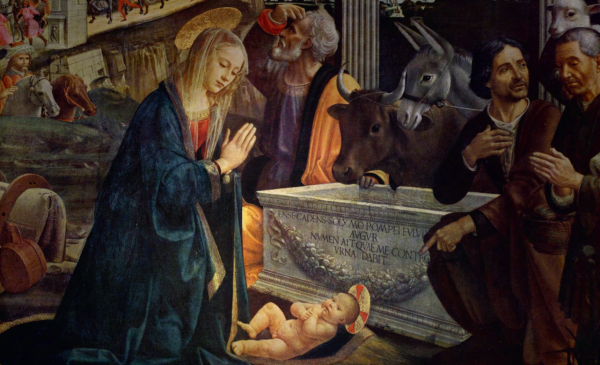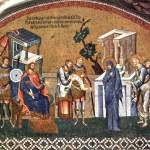Jesus’ Birth and when Herod the Great *Really* Died
by Jimmy Akin
Filed under Historicity, The Incarnation
The Gospel of Matthew tells us that Jesus Christ was born in the final years of the tyrant known as Herod the Great. He tells us that when Jesus was born, Herod panicked and had all the baby boys in Bethlehem killed. Fortunately, the Jesus' family escaped to Egypt and remained there until Herod was dead.
They didn't have to stay long, though. Here's when Herod the Great actually died . . .
Setting Aside a Common Mistake
For just over a hundred years, the question of when Herod the Great died has been dominated by a proposal by the German scholar Emil Schurer. He suggested that Herod died in 4 B.C., and this view took off in scholarly circles. But in recent decades, it's been challenged and, as we saw in a previous post, the arguments for this position are exceptionally weak.
So when did Herod actually die?
The Length of Herod's Reign
Here is how the Jewish historian Josephus describes the timing of Herod's death:
"So Herod, having survived the slaughter of his son [Antipater] five days, died, having reigned thirty-four years, since he had caused Antigonus to be slain, and obtained his kingdom; but thirty-seven years since he had been made king by the Romans." [War of the Jews, 1:33:8 (665); cf. Antiquities of the Jews 17:8:1 (191)]
In this place, Josephus dates Herod's death by three events:
- Five days after the execution of his son Antipater.
- Thirty-four years after he "obtained his kingdom" (i.e., conquered Jerusalem and had its Hasmonean king, Antigonus, killed).
- Thirty-seven years after "he had been made king by the Romans."
The death of Antipater isn't a particularly helpful clue, but the two ways of reckoning the length of his reign are.
First, though, we need to answer one question . . .
How Is Josephus Counting Years?
Kings don't tend to come into office on New Year's Day, and so they often serve a partial year before the next calendar year begins (regardless of which calendar is used). They also don't die on the last day of the year, typically, so they also serve a partial year at the end of their reigns. This creates complications for historians, because ancient authors sometimes count these additional part-years (especially the one at the beginning of the reign) as a full year. Or they ignore the calendar year and treat the time that a king came into office as a kind of birthday and reckon his reign in years from that point.
What scheme was Josephus using?
Advocates of the idea that Herod died in 4 B.C. argue that he was named king in 40 B.C. To square that with a 37-year reign ending in 4. B.C., they must count the part year at the beginning of his reign and the part year at the end of it as years. That's the only way the math will work out.
The problem is that this is not how Josephus would have reckoned the years. Biblical chronology scholar Andrew E. Steinmann comments:
"[T]here is no evidence for this [inclusive way of reckoning the partial years]--and every other reign in this period, including those of the Jewish high priests, are reckoned non-inclusively by Josephus." (From Abraham to Paul, 223)
In other words, Josephus does not count the partial first year when dating reigns in this period.
Knowing that, what would we make of Josephus's two ways of dating Herod's reign?
Herod Appointed King
As we saw in the previous post, Josephus gave an impossible date (one that did not exist) for Herod's appointment as king. He said it was in the 184th Olympiad, which ended in midyear 40 B.C. and that it was in the consulship of Calvinus and Pollio, which began in late 40 and extended into 39. Those can't both be right, but one of them could be.
Which one? The evidence points to 39 B.C., because we have another source on this: the Roman historians Appian and Dio Cassius. Appian wrote a history of the Roman civil wars in which he discusses the appointment of Herod in the midst of other events. By comparing this set of events to how they are dated in Dio Cassius's Roman History, it can be shown that the events in question--including the appointment of Herod--took place in 39 B.C.
Given how Josephus dates reigns in this period, he would not have counted Herod's partial first year in 39 B.C. but would have started his count with 38 B.C.
Count 37 years forward from that and you have 1 B.C.
Herod Conquers Jerusalem
As we saw in the previous post, Josephus gives contradictory dating information for Herod's conquest of Jerusalem. Some of the dating information he provides points to 37 B.C. and some points to 36 B.C. Josephus said Herod died 34 years after the event.
Bearing in mind that Josephus wasn't counting partial first years, that would put Herod's death either in 2 B.C. (if he conquered Jerusalem in 37) or in 1 B.C. (if he conquered the city in 36).
There are various ways to try to resolve which, but some are rather complex.
At least one, however, is quite straightforward . . .
Herod's Lunar Eclipse
We saw in the previous post that Josephus said Herod died between a lunar eclipse and Passover. While there was a partial lunar eclipsed before Passover in 4 B.C. there was a total lunar eclipse before Passover in 1 B.C. Further, the lunar eclipse in 1 B.C. better fits the situation Josephus describes (see the previous post for details).
Since 4 B.C. is outside the range indicated above, and since the 1 B.C. lunar eclipse fits the situation better, that lets us decide between 2 B.C. and 1 B.C. in favor of the latter. There was no lunar eclipse in 2 B.C., pointing us toward 1 B.C.
Final Answer?
Putting together the pieces above, we have:
- Reason to think Herod died in 1 B.C. based on the amount of time he served after being appointed king by the Romans.
- Reason to think Herod died in either 2 or 1 B.C. based on the amount of time he served after conquering Jerusalem.
- Reason to think Herod died in 1 B.C. because of the lunar eclipse that occurred before Passover.
More specifically, he would have died between January 10, 1 B.C. (the date of the lunar eclipse) and April 11, 1 B.C. (the date of Passover).
Most likely, it was closer to the latter date, since Josephus records a bunch of things Herod did after the eclipse and before his death, some of which required significant travel time.
There is also one more reason that we should reject the death of Herod in 4 B.C. in favor of a 1 B.C. date . . .
We Know When Jesus Was Born
We don't have to restrict our knowledge of when Herod died to the sources and events mentioned above. We can also date his death relative to the birth of Christ. For some reason, moderns seem to think that the dating of Herod's death should govern when Jesus was born, but the logic works both ways: if we know when Jesus was born, that tells us something about when Herod died.
And we, in fact, have quite good information about the year in which Jesus was born.
It was after 4 B.C., ruling out that date.
So . . . what year was Jesus born?
Stay tuned for my post tomorrow on Christmas Day. . .
PS. If you like the information I've presented here, you should join my Secret Information Club. If you're not familiar with it, the Secret Information Club is a free service that I operate by email. I send out information on a variety of fascinating topics connected with theology, science, history, and more.
Just sign up at www.SecretInfoClub.com or use this handy sign-up form:
If you have any difficulty, email me at jimmy@secretinfoclub.com.
Related Posts
Note: Our goal is to cultivate serious and respectful dialogue. While it's OK to disagree—even encouraged!—any snarky, offensive, or off-topic comments will be deleted. Before commenting please read the Commenting Rules and Tips. If you're having trouble commenting, read the Commenting Instructions.













